 Tuesday 2 May I noticed a tweet of Tom Simonts (KBC) about “the BIG debate : Things to do with your money” organized by the financial students organization Capitant. I changed my evening plans and decided to go to Antwerp. The theme of the debate was to manage wisely and knowledgable your money as (graduating) student.
Tuesday 2 May I noticed a tweet of Tom Simonts (KBC) about “the BIG debate : Things to do with your money” organized by the financial students organization Capitant. I changed my evening plans and decided to go to Antwerp. The theme of the debate was to manage wisely and knowledgable your money as (graduating) student.
Serge Mampaey, journalist at De Tijd, was leading the debate between 4 participants :
- Tom Simonts, Senior Financial Economist KBC
- Robert Van Beek, author of 10+ Financial books and financial planning expert
- Stijn Derynck, Financial coach and entrepreneur at Derynck Financial Consulting
- Frank Peeraer, CEO Fortuna Financial group
Tom Devolder, Chairman of Capitant introduced the evening for an aula full of students (95%), parents of students and university professors. Tom explained that the debate will be centered around 7 statements that the panel members will discuss and express their opinion about. Everyone in the aula could vote on each money statement and give his or her opinion on how to use his or her money wisely.
The BIG Debate : Things to do with your money
S1. For young people/students it is important to invest as soon as possible in the stock market ?
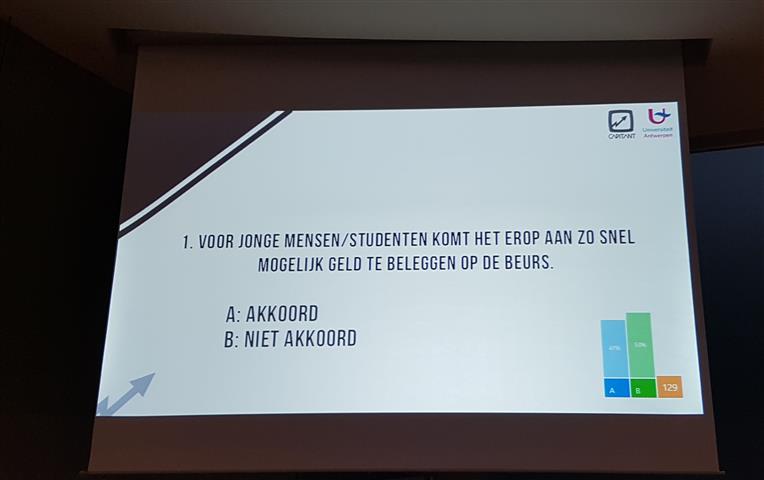
53% DOES NOT agree. 47% Agree (129 answers)
Serge Mampaey explains about his first share purchase and how he sold at a nice profit. He asks first Tom’s opinion…
Tom : I think it is important to lose as soon as possible money (lose…Serge asks?) so you have some learning mistakes. It is important to learn about risk management and make some beginner’s mistakes. But do it with virtual money…
Robert agrees. You might want to buy a home,…but stocks give you the most return on investment. But diversification is important. Spread your risk is important. You need to learn how to invest at young age.
Stijn also agrees that diversification is important. How can you do this ?You can start with pension fund plan where you can also protect yourself. This has also a fiscal advantage. The sooner you start, the bigger the snowball. But losses and a bad year are inevitable…
Frank asks the question “Is it important to start with pension ?” Frank is disappointed about the poll result. Inflation is 2% and your savings account is 0,11%. Your professors need to teach you soon that an investment in the stock market gives you the biggest return. Buy a Solvay, Bekaert or Barca or a mutual fund. Don’t look at bad examples of the past such as L&H and Fortis. Consistent investing in the stock market is a MUST.
Serge highlights that the return on the BEL20 is 3,5% today. Tom adds that you need to ask yourself the question “Are you an investor or a speculator?” BPOST is 5,3% return on your investment. Solid company with a positive cash flow.
S2. For young people/ students is it important to save for the future?
66% agrees. 34% does not agree.
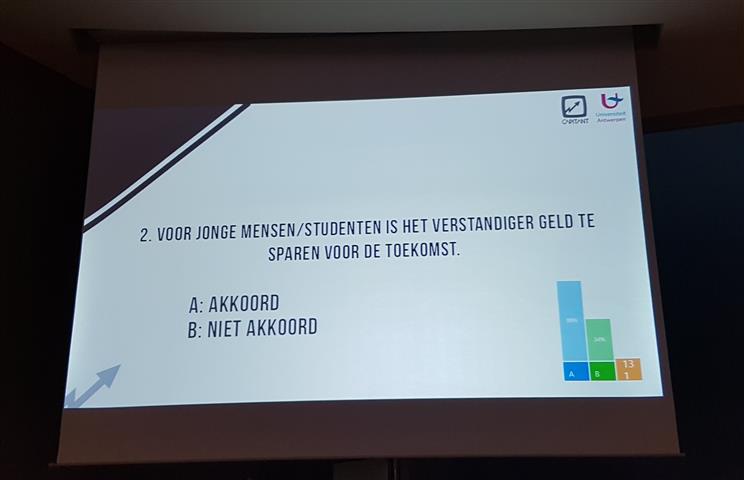 Robert advises to put consistent saving money in a low cost tracker. This is a fund that follows an index or a sector. When you can increase this snowball instead of a savingsaccount, your snowball also benefits during bad times.
Robert advises to put consistent saving money in a low cost tracker. This is a fund that follows an index or a sector. When you can increase this snowball instead of a savingsaccount, your snowball also benefits during bad times.
Stijn states that a savingsaccount is totally not wise to do. Here’s what you should do….when you start to work, you need to first build your emergency fund of 3 to 6 months salary. Everything above 12k Euro should not be on your saving account. 220 billion Euro is today on savings accounts in Belgium and it does not give any return and loses 2% buying power.
Know for what purpose you are saving for…a house, a car, travel,…put a target amount and work towards that amount.
Frank starts with saying that “You may also spend your money…don’t worry.” Frank has a daughter who likes to spend money. For the universities there’s an important role to teach our youth financial literacy about the stock market. Many people believe that the only good investment is real estate. This is no longer the case. Real estate is not always the best investment. Your professors need to give you a decent financial education about investing in the stock market…
Serge concludes that reading De TIJD can also be beneficial… if you want to gain financial literacy (laugher in the aula)
S3. For young people is it wiser to be active in starting up an company or to invest in a project
60% agrees
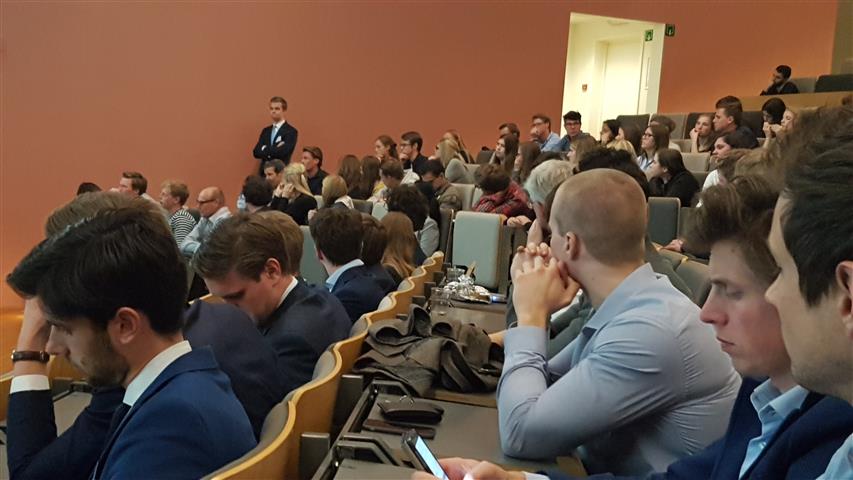 Tom : If you invest, you give someone your money. This is investing in a company and returns into a profit. What is entrepreneurship? What is a company that creates value and growth? How does my investment result in a return on investment? We all want to be rich but you need to understand how a company operates. Buying a stock is becoming an owner of a company.
Tom : If you invest, you give someone your money. This is investing in a company and returns into a profit. What is entrepreneurship? What is a company that creates value and growth? How does my investment result in a return on investment? We all want to be rich but you need to understand how a company operates. Buying a stock is becoming an owner of a company.
Stijn thinks that many young people want to do a startup. But when you are young, you don’t know the practicalities of a company. It is important you have experience in a certain sector. Example…start first doing all financial jobs if you want to work in the financial sector.
You only start a company because you have a great idea, not from the fact that you have money such a s 10k for example… Sometimes you will fail. Entrepreneurship you can learn.
Frank: Do’s and don’t of leading a company. I am a risk averse CEO. You don’t need a lot of money, just knowhow, an office and laptop. My company runs on commissions. For a business in the horeca, you need a lot more capital to start. Which sector, which company you want to start…
Frank was a football player and became better over time. Same for his financial business where his financial knowhow grew over time. Frank did build up his capital first before starting his company.
Robert: If you can not find the money, it is possible you need to address the stock market. We all want to be the new Marc Coucke or the new social media platform. In the past, 40% of the young people wanted to work for the government, but thank God this is not the case this evening. Anyone can be a CEO of a family business going forward.
Serge asks whether anybody in the panel has experience with loans for investing in projects ?
Stijn : Crowdfunding. You need to think twice if you invest in a crowdfunding project. This is high risk and without any guaranteed return on investment.
S4. Investment opportunities are more beneficial abroad than in Belgium. Expanding your horizon as entrepreneur is required.
68% agrees. 32% does not agree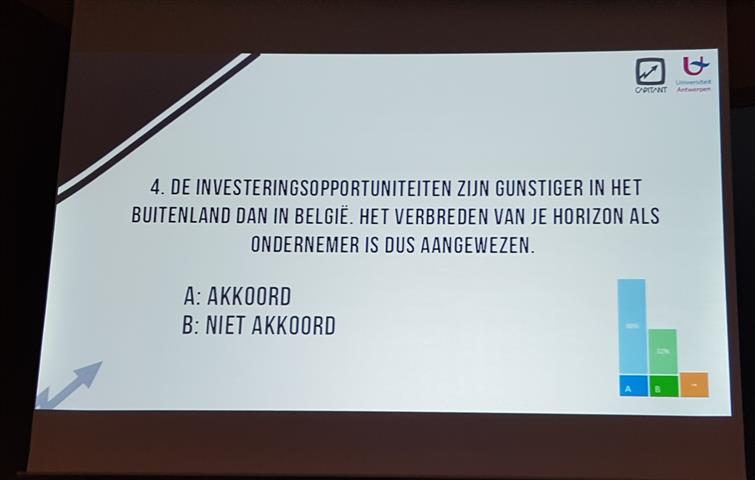
Serge asks the open question what could be the reason to go abroad…too many taxes,…too many rules, …too difficult to find customers. After some discussion, Serge concludes that it appears that the Belgian government is guilty of killing entrepreneurship.
Robert states that he tax pressure in the Netherlands is definitely lower. In the US you can fail more easily. Tom states that tax pressure on companies is not so different abroad. Personal income tax is indeed very high in Belgium.
Here lives the perception that the company taxes are high. Many companies have tried their luck abroad. It is not so much better.
Frank says that Luxemburg is a financial centre (with nothing of social activities). Taxes in LU are the same as in Belgium. Frank does not agree with the vote of the young public. Bekaert is a great example. Perception against our Belgian government..can we trust them? Things can change all the time…for example the tax shelter for companies. And at the end the entrepreneur requires to pay.
Stijn says that there are definitely opportunities abroad. For example in India. But always start first in Belgium. Tom concludes that you can first look abroad if the knowhow or technology already exists before building it here..
S5. Debt to follow an extra Business school education is wise and will without any doubt return in a higher return in the longterm
34% agrees. 66% disagrees
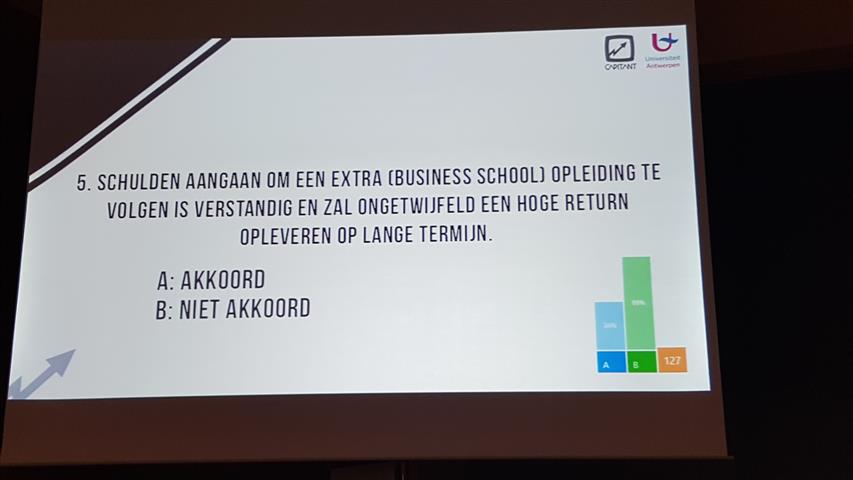 Frank agrees with the vote of the public. Do first some experience within a sector and decide later…This is the correct vision.
Frank agrees with the vote of the public. Do first some experience within a sector and decide later…This is the correct vision.
Tom asks the question “Is an extra MBA important to start at KBC? “. Yes, it is for risk control and management skills. It is a requirement to get a job at KBC. In the financial sector, it is important. It doesn’t need to a HARVARD..:-)
Robert reasons that if you can study further, it might be wise. Do you need to have a loan? Doubtful. Look at the US. Do you want to invest 60-70k within your education? It is an individual choice.
Stijn asks the question “Is it a requirement for hiring an employee?”. No. Passion for the job is more important. For a management function, management skills are important.
S6. Debt to have an international experience (job, study, or internship) is it wise and will it give a high return on investment
53% agrees, 47 % disagrees
Robert visits a lot of congresses and he want to learn as much as possible. There are many interesting seminars abroad. Definitely always a wise investment. But do you need a loan? No. Stijn considers an IFS study a wise choice. Going abroad expands your horizon. When you take a loan to do this, is it valuable? He doesn’t think so. Frank knows a few Erasmus students that have done this. This is important for your language skills. Frank goes often to Spain and there they speak only Spanish. Frank’s advice is to learn your English, your Spanish,..your language skills.
Tom considers working experience from Frankfurt and UK as important. He does not agree to have a loan, but he agrees to go abroad. It is always an enriching learning experience.
Serge concludes that he took the decision once NOT to go abroad for his girlfriend and one year later he was single….
S7. At young age having a loan to buy real estate instead of renting is an intelligent choice
63% agrees
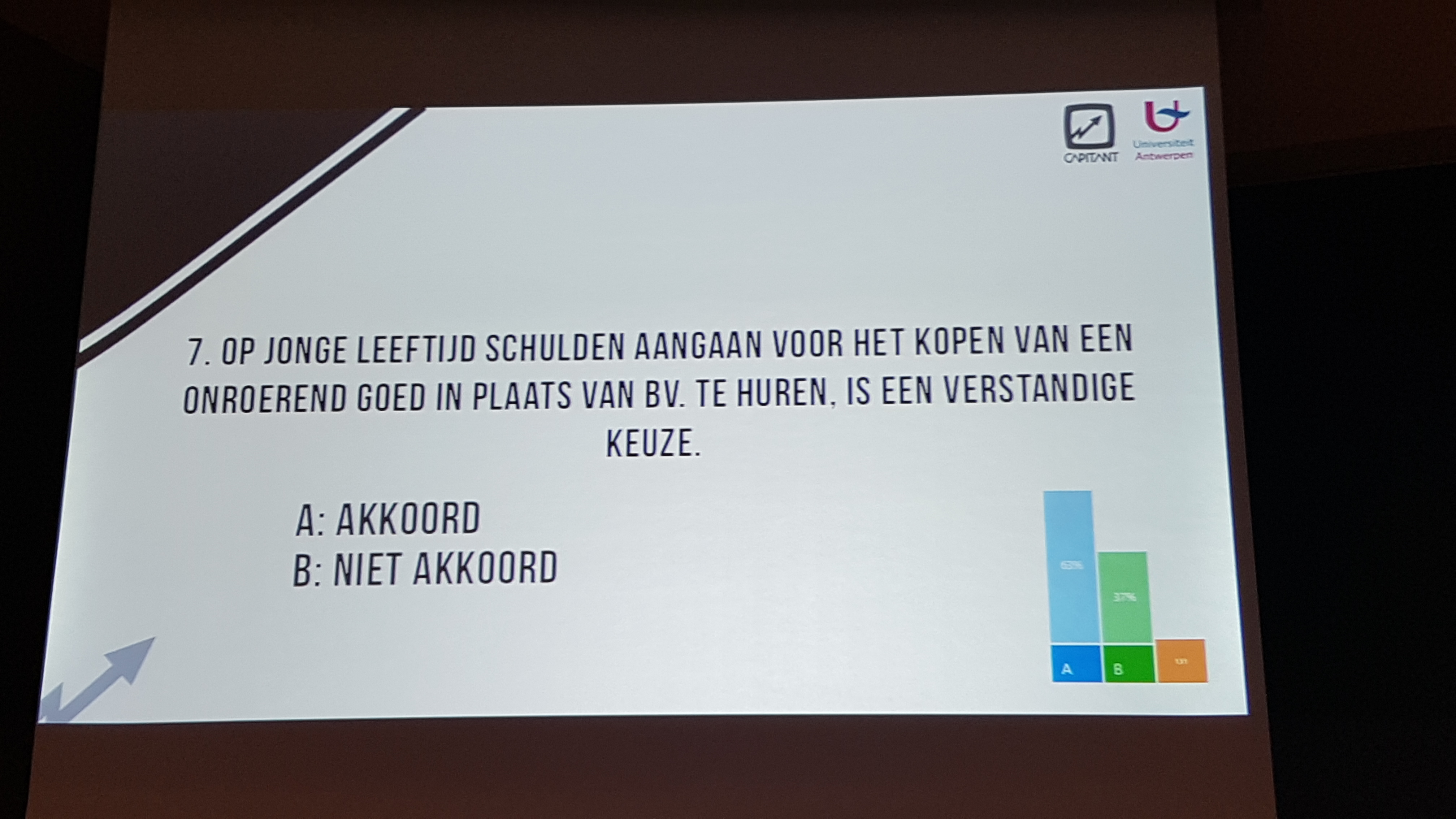 Serge concludes that this vote illustrates that Flemish people still have a brick in their stomach…
Serge concludes that this vote illustrates that Flemish people still have a brick in their stomach…
Frank states that Germany is the best ecomony. 75-80% of people there rents in that country. Don’t start with investing in current high house prices! Divorce rates are high. 3 out of 4…you don’t know the house market… Frank recommends to rent first and build your net worth and review the market.
Stijn says that financially buying is a wise thing to do. But everyone sees on social media the nice houses and apartments of friends. Robert Kisoyaki (Rich dad, poor dad) will say that this is an asset. You don’t have any return on this asset. You don’t know where your job will be… your employer can change. Do you want to drive 2 hours each day when you change job. Where you will buy where you will work defines the distance you drive every day… Also don’t overbuy. Don’t loan more than 33%. How much interest do you pay is important?
Robert says that it all depends… Look at UK, Netherlands, US…don’t expect real estate capital gains over time. Stijn agrees that t is not easy to purchase a house without help of parents and the required savings. You first need money to buy a house. First saving money…when you are young, many people look at new houses. Look at a small investment to start with.
Tom says that you can also invest in real estate within the stock market. Examples are Cofinimmo, Home Invest, Qrf City Retail,.. with a dividend of 3-5%. This is a good investment on the longterm. Investing in real estate to rent and doing this yourself is very stupid. Very expensive …and 1,5 -2% return today.
Frank concludes that many of his wealthy clients have problems with tenants and need to go to court daily to get their rent or try to get their tenants out of their property. Taxes and maintenance costs…is it all worth it? If you are interested in investing in real estate in the stock market…Aedifica is a peril in the real estate sector of pension homes. An investment for the future and this sector will become more and more important. Please review this company for an investment.
Questions:
During the questions round, one female student asks the intelligent question how do you start with your stock selection if you want to invest in the stock market ?
The answers of the panel members were quite different…from giving individual “golden” (?) tips on specific companies to an investment strategy advice. Here were the options thrown towards the students :
- Start with an investment in a fund with a consistent monthly amount…
- Investment tips : Aedifica, Bekaert, Starbucks, Coca Cola. Do not invest in gold mines,…and take risk
- Inform yourself…and invest in index trackers or ETFs
Our Key Learnings
So what did we learn from this evening ? How do students and our youth think about what to do with their money ?
- More than half of the students don’t want to invest in the stock market as soon as possible.
- The majority of the students considers saving money for the future a MUST.
- 60% of students would like to be an entrepreneur or invest in a project.
- Young people think it is more beneficial to invest abroad.
- Having a loan or debt for an extra MBA is not an intelligent decision.
- More than 50% believes investing in an international career is wise thing to do.
- The majority of students thinks buying real estate as soon as possible is a priority.
Our Opinion
Now let’s review the students’ opinion, the answers of panel members and give it a twist based on our own (financial) experience. We list out here our 5 tips and review the answers of the panel members and students.
TIP 1 : Build your emergency fund as a priority 1
In Question 2 the majority of the students agreed it is important to save money for the future. According to Stijn, it is important to have this emergency fund of 3 to 6 months on a savings account. And I agree with him. When you are young, build first that financial cushion in case of problems. This is our layer 1 in our financial pyramid.
But make sure you realize that a savingsaccount does not return you any cashflow and is lower than inflation in Belgium. So you lose money every year. Otherwise read an older blogpost that I wrote about this topic
Read about collective (stupid) behavior of the Belgian population
We fully agree with Stijn that anything above 6 months of salary, should be invested differently. We advice to do this according to our layers of the financial pyramid.
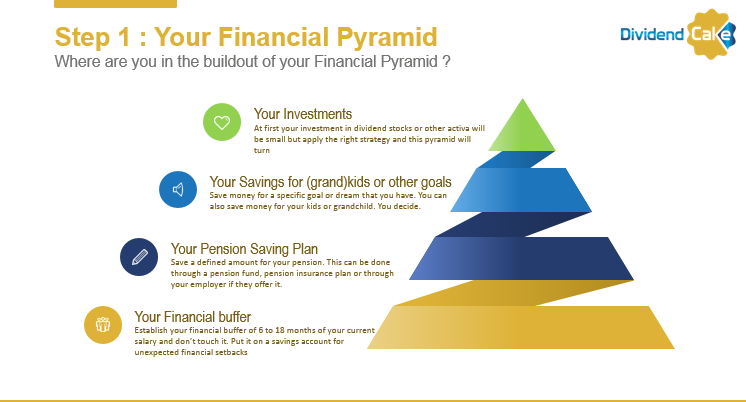
TIP 2 : Invest in YOUR retirement
Investing in the stock market can also mean invest in your retirement. Unfortunately only Stijn mentioned this during the discussion but the importance of investing money on a consistent basis for your retirement within a pension fund plan should have been more emphasized to young people. Young people consider a retirement plan not a priority as they use their money differently.
Why your retirement planning is important in your financial planning, is in detail explained in the blog post of last Wednesday. Don’t have unpleasant surprises at the end of your career.
How you can LOSE all your net worth and make also your kids poorer….ACT NOW !
When you are young, start with the fiscal maximum amount per year (today 960 Euro) and put it in a pension fund plan. Do this each year on a consistent basis. The sooner you start the greater your snowball at the end of your career. (Layer 2 in our Financial strategy) When your employer offers a group insurance plan for your retirement, take it. When you chose an employer, take a group insurance plan of an employer as a key decision point when you have multiple offers from different companies.
TIP 3 : Rent before you buy
On statement 7, it was not a surprise that the Flemish students also have a brick in their stomach. The importance of having your own propery as soon as possible is passed on from parents to children. It is still a strong believe amongst Belgian youth and people that this is a priority 1. Here I fully agree with Frank that renting before buying (or living at your parents or sharing a house/apartment with friends) at young age is a better choice. Your career evolves over time, your employers change…Even divorce rates are high these days. Buying a house results in maintenance costs and other extra costs that you are not aware of.
Buying a small property is another wise choice (as Stijn mentioned) and then evolve over time. The key priority at young age must be to MAXIMIZE your SAVINGSRATE and building up your wealth.
Investing in real estate for rent is not recommended by the panel members. The ROI of these investments are according to official figures between 2-5%. If you don’t have the knowledge and required capital, it is not a wise thing to do. As Tom mentions, you can also invest in real estate by investing in the stock market buying company shares of Aedifica, Home Invest, and other real estate companies.
TIP 4 : Follow YOUR dreams
Question 3 to 6 was polling about the behavior of students and whether they would invest money in an extra MBA, an international career or their own company. Here we can understand the answers of the panel members. But we recommend you mainly to FOLLOW YOUR DREAMS.
If you want to start that company with a great idea, go for it as Gary Vee would say and “FUCK IT with what others think” (Gary Vee’s statement) Watch the YOUTUBE video of this entrepreneur by clicking his name. Do you know Pieter Zwart of the ecommerce shop Coolbue who started at his home selling products from his bedroom in 1999? Now he is sellling more than 857 million Euro products. You can gain experience as you progress and failing is allowed. You may succeed the second or third time…
Investing in a extra MBA or an international experience depends on your own choice. Personally both investments are an enriching experience and will prosper your career in the longterm. Personally I have done an Executive MBA after 10 years of working experience and I agree with Frank that it is more beneficial after several years of employment. You can also be sponsored by your employer which avoids to have debt at the start of your career. An international career is also beneficial to understand different (work) cultures and learn languages. Personally I speak 5 languages fluently and it has helped my career to grow internationally.
There are definitely opportunities abroad and a lot of knowhow exists abroad. As I travel to many countries throughout the year, I notice how the digital technology advances in China, US, and other countries and how we live in a global economy where everything evolves quickly. Today you may be a leader, but tomorrow you can become a follower…
TIP 5 : Invest wisely in the stock market
Investing in the stock market can be done in many different ways. You can invest in your knowledge and become a day trader or you can be a value or growth investor in companies. You can use fundamental or technical analysis. You can invest in bonds, ETFs or funds…there are a million ways on how to invest in the stock market. Here are our 5 tips for investing in the stock market…
- Invest in your knowledge and write down YOUR OBJECTIVE with investing in the stock market. Do you want to focus on capital gains, dividends, creating a passive income,…what is your goal?
- Invest in learning the strategy required for your objective. A dividend investor has a different strategy, than a value or growth investor… or a day/swing trader. It depends on your investments horizon and your objective. You can combine different strategies over time as you build up your knowledge. Become part of a Facebook group such as BEURS-HOBBY and learn from other investors.
- Know and ALWAYS understand what company or product (ETF, index fund,…) you are investing in. Don’t rely on “golden” tips but do your own homework and NEVER lose money. Sell your shares if you drop at purchase price or below 5%. Too many people hold and pray that the stock price may return one day to the purchase price and new highs. You can always buy cheaper later if you believe in this company.
- PAY YOURSELF FIRST at the start of each month. When you want to save money from your salary, put this money with an automatic transfer automatically in your investment account (Monthly contribution to your pension fund, and the rest in your investment broker account) It was sad nobody of the speakers spoke about this…Spend what is left.
- Watch your expenses of the bank as they eat your return on investment away. Investing in high cost mutual funds is not a good investment strategy. Learn about low cost ETFs and index funds if you want to invest in a diversified product.
Finally we want to conclude by saying that every young student should read the story of two computer engineers/children’s authors, FIRECracker & Wanderer, who retired at 31 to travel the world! Here’s their blog Millennial Revolution. They were at the same age as the students in the aula and they took a great decision at young age….now they are retired and financially free.
Yesterday 4th of May an interesting article was also published on Marketwatch.com . Only one in three millennials in the US is investing in the stock market, according to the results of a study released by BankRate. Read this article if you want to learn more about investing in the stock market.
Millennials ought to be 100% invested in stocks
Thanks for reading this blog post. We hope it was a learning experience for you and if you only learned ONE thing from reading this, we are happy as then we succeeded in our mission to teach you something. We applaud Capitant for organizing this event for their students.
Keep on following us on Twitter and Facebook where we share more blog posts and other articles. Share THIS blog post on your timeline in Facebook if you believe it is valuable for your friends.
You can always translate this blog post in your OWN language by using the Google Translate selection at the top right of the page.
Subscribe to our newsletter so you don’t miss our next blog post. Thanks
Leave your comments and feedback. Do you agree with our tips ?
What is your opinion and feedback on this event ? Do you have a different financial planning in mind?


3 Response Comments
Sounds like a really eyeopening conference. Thanks for the link to the BankRate study. It is too bad how millennials, many of whom likely grew up hearing about the “financial crisis,” are now too scared to invest in the market at all.
Scott
Thanks a lot for your presence and inspiring blog post. Could you try to contact me via facebook or my e-mail? I would like to share this post on social media.
Best Regards
Hi Tom, sure you can share this blog post. Thanks a lot !!!